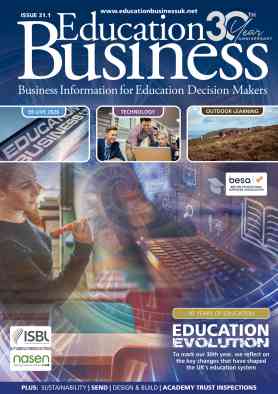Investing in Social Business
 However, with this challenge comes scope – the potential to introduce and grow a new business model within schools that sees them taking ownership and control of their assets and resources and using them to the benefit of the school, its pupils and its communities. Investing resources and funds in the building of long term, sustainable social enterprise solutions allow schools to capitalise on the resources and assets at their fingertips.
However, with this challenge comes scope – the potential to introduce and grow a new business model within schools that sees them taking ownership and control of their assets and resources and using them to the benefit of the school, its pupils and its communities. Investing resources and funds in the building of long term, sustainable social enterprise solutions allow schools to capitalise on the resources and assets at their fingertips.
One of the greatest of these assets is the ideas and enthusiasm of a school’s young people and by getting them involved in new social business ventures the value of those ventures increases exponentially. From fundraising and marketing to planning and financial management, through social business young people can not only contribute to the revenue growth of the school but also develop skills not commonly offered by other learning routes.
Of course, enterprise in the curriculum is not a new thing. Indeed, many schools already undertake enterprising activities on a short term project basis, but the key for change is to translate that activity into long term sustainable social enterprise that benefits everyone. It’s an idea which is already turning heads in the business world, promoted by leading thinkers like Charles Leadbeater. “All schools should be the base for a productive social enterprise so that children associate learning with work, get pleasure from working productively together and contributing to a business,” he explains in his book Innovation – What’s Next- 21 Ideas for the 21st Century. “Education is too cut off from the real world. One way to provide children with more opportunities for real-world learning is for all schools to become productive social enterprises.”
Taking the step from social enterprise project to sustainable social business requires drive, ambition and commitment, but when it works it really pays off - something Launceston Primary in Cornwall found out this year when their pupils set up Just Beez [www.justbeez.org], a social enterprise developed and run by the school’s year 6 pupils to help address the plight of the British bee population.
Since making the initial decision to set up a social business, the pupils have led on all aspects of the business including the design and manufacture of a range of 100% natural beauty products, made with Cornish beeswax and honey. They have negotiated sponsorship deals and set up key distributor relationships, run a successful launch event and built a business plan for their profits, reinvesting part back into the business and school while also donating part to a bee conservation charity.
Similarly, Writhlington School near Bath has taken social enterprise to new heights with WSBE Orchids, a conservation-focused business which raises and sells thousands of orchids each year, running the UK’s leading orchid collection from the school’s greenhouse and involving young people at every stage.
Writhlington’s orchid business is now common fixture at all the major flower shows, has won countless horticultural awards, has been heavily featured on TV and is now working in partnership with Royal Botanic Gardens in Kew, and the Eden Project supplying rare orchids for their collections. Money raised through the business is invested back into WSBE and the school as well as into global conservation projects which are managed by Writhlington’s A level students.
It’s impressive and inspiring to hear see what young business minds can achieve, but schools are about much more than just young people. Increasingly schools are looking to the wider community for support, involvement and even revenue-generating opportunities; fertile ground when it comes to social business. Developing schools as community hubs is a great way of taking early steps into the world of social business, it’s collaborative, builds on existing relationships and enables a school to respond directly to the needs and wants of its own community and location.
Abbeymead School in Gloucester is pioneering the community hub approach, working with Real Ideas Organisation Schools Service to develop their own Community Enterprise. Building on the work they have done around social enterprise over the last four years they are now looking to use social enterprise as a community tool by working with different outside partners, businesses and community organisations which are looking to collaborate, take on real commissions and even run community services.
So whether it’s spearheaded by young people, driving community engagement or capitalising on a school’s physical assets and resources, social business has a lot to offer in the rethink of how schools are managed and run. How a school operates is integral to the sort of education it provides and by addressing the challenges of the current education climate with a social business framing in mind, that sort of education is a very exciting prospect indeed.
For more information
The Real Ideas Organisation’s (RIO) Schools Service is the enterprise solution for schools. Designed to fill the gap left by recent shifts in the education sector; RIO provides cost effective ethical consultancy to help heads, teachers and pupils get the most out of their school; introducing real, impactful, purposed learning. www.realideas.org/schoolsservice
Latest News
11/02/2026 - 10:53
The government has launched its new ten-year Education Estates Strategy, backed by £1 billion.
10/02/2026 - 09:47
Spending on schools across Scotland has increased by more than £1 billion in real terms over the past decade, statistics show.
10/02/2026 - 09:34
New training to empower school staff to improve mental health and wellbeing support for neurodivergent students has been launched by Anna Freud, a mental health charity transforming care for children and young people.
09/02/2026 - 09:58
Data from BAE Systems’ annual Apprenticeship Barometer found that 63% of parents said they would prefer their child to choose an apprenticeship over a degree after school.
06/02/2026 - 09:59
The work builds on guidance launched by Cardiff Council in autumn 2025, which provides clear and practical advice for schools responding to incidents where weapons are brought onto school premises.







